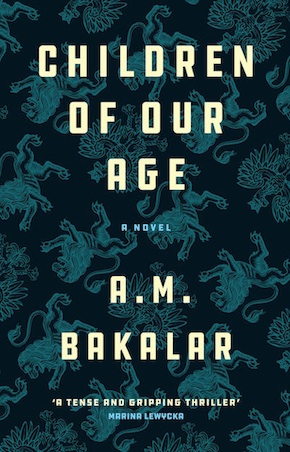Us and them
by A.M. Bakalar
“Exposes the tragic face of the immigrant experience; [a] powerful story of exploited hope, perverse ambition and redemption.” William Brodrick
According to the Office for National Statistics, Polish is now the second most spoken language after English in the UK, and Poles constitute the second largest immigrant group after Indian nationals, with just over 800,000 of us living in Britain. This recent wave of immigration is just one of many Britain has experienced in its long history of migration to this island, but it has been by far the most sudden and conspicuous. It should not come as a surprise that Polish immigrants are an easy group to exploit in right-wing hysterical rhetoric that aims to show the British public they have a serious problem with immigration.
In this poignant moment in British history where almost everybody is engaged in heated debates about Brexit and what’s next for Britain, discussion of the presence of Poles is almost inescapable. Given the much-repeated myth that Polish shopkeepers, builders, writers, cleaners, taxi drivers, photographers and businessmen are conquering this tiny island, little by little eradicating the locals, it is instructive to know that in fact Poles constitute little over 1% of the UK population, among a foreign-born influx of around 14%, which is broadly in line with immigration rates in the US, France, Germany and Spain.
The man’s passport was taken away from him and used to claim benefits in his name while he was left destitute on the streets.”
Until I decided to write a novel about Poles involved in benefit fraud I was little aware of their trade. Although in my previous novel I ventured into the world of cannabis growers, there were not that many Poles I came across who were involved in this business. I remember clearly the time when the idea came to me; it was towards the end of a dinner I had with Gosia McKane, founder of Merseyside Polonia, a non-profit organisation based in Liverpool set up to raise awareness about Poles and their culture in the local community. We were saying our goodbyes outside Oxford Circus tube station, exchanging last-minute stories and wishes. It was already late and Gosia needed to get home, and then she told me about a Pole trafficked to Britain by other Poles. The man’s passport was taken away from him and used to claim benefits in his name while he was left destitute on the streets. Unable to speak English, the man would have perished among other homeless people, but the local police found him and Gosia translated his story. Luckily, the man was soon on his way back to Poland.
On my way home, I could not shake this story from my mind. At the time, I was over 70,000 words into a new manuscript which had almost nothing to do with Polish immigrants. But how could I not write a story of Poles trafficking Poles? It was simply impossible for me to ignore what Gosia had told me. I immediately thought of the Latin proverb Homo homini lupus est (‘Man is wolf to man’). It still invades my thoughts whenever I think back to the time when I was working on the manuscript. It was beyond my imagination that Poles would become so efficient in duping their own countrymen. I could not help but admire their business acumen, their energy to tap into the new system, their adaptability to the new culture. It was somehow ironic that those who barely spoke English became such experts in navigating the British tax and benefit system. I simply could not ignore the story.
During this whole process it never occurred to me that writing a novel about Polish traffickers could somehow fuel the negative image of Poles in Britain, the same way it did not when I wrote the first book. Although the characters in my second novel are either perpetrators or victims of trafficking, I consider the book a story of human choices. Each character finds him or herself entangled in the politics of the world they live in. Whether by their own design or forced by circumstance, they are essentially trying hard to find happiness in their lives. My story is just one story and there are many out there worth telling.
When Madame Mephisto was published, I began receiving critical and strong-worded emails from fellow Poles accusing me of lack of respect for my own country. One lady, who frankly admitted she had not read my novel but only heard about it, expressed her deep disappointment with the fact that I, an educated Pole, aware of my home country’s tragic history, chose to disrespect my own nation. “Your book will do us no good abroad,” she concluded.
It never occurred to me that writing a novel about Polish traffickers could somehow fuel the negative image of Poles in Britain, the same way it did not when I wrote the first book”
I emailed Maria Jastrzębska, a Polish poet and author who also writes in English. Maria grew up in Britain in the 1960s and ’70s. Previously her work has drawn on Polish themes. I asked her whether she felt the need to write about Polish culture and immigration, especially now. She told me: “We need to learn about one another’s cultures and customs if we are ever to overcome ignorance and prejudice. But writers are not publicists. We are expected to be ambassadors representing the particular communities we come from and we are sometimes labelled or pigeonholed as such. The danger then is that we are dismissed, marginalised even more, the complexity of our work reduced in some way. This is limiting of course, and places a burden on imagination and creativity.”
The title of my new novel is from Polish Nobel Prize winner Wisława Szymborska’s poem ‘Children of Our Age’ (translated into English by Claire Cavanagh and Stanisław Barańczak), which states: “Whether you like it or not, / your genes have a political past, / your skin, a political cast, / your eyes, a political slant.” Though the poem was published in Polish for different times in 1986, its message is clear: trying to escape from politics is futile.
The flipside of choosing a politically charged topic as the basis for a novel, a poem, or a short story is the fact as artists, whether we like it or not, we will inevitably be forced to face the outside world. Chances are, we will be called upon to defend our creative output. Even more so as non-Western non-English authors, writers who choose not to write in our mother tongue. We will find ourselves facing both sides: our hosts of a culture in which we reside and the people of the country we left behind. But it is dangerous for a writer to be forced to fulfil a mission or adopt some political position. Are we, Polish authors living and writing in Britain, by definition expected to represent our culture in a certain way, just because we are a part of a large immigrant group?
Not long ago, I talked about it with another Polish author friend, Agnieszka Dale, who also writes in English. She was commissioned by BBC Radio 4 to write a short story. As she was working on what became ‘A Happy Nation’, we discussed various versions of her story. How would the British listeners and readers react? Would a Britain without immigrants be plausible? Or perhaps the story needed to be toned down, so as not to offend our hosts’ sensibilities?
As Polish immigrant writers we are often expected to fit into a specific narrative. Media outlets want us to fit their often parochial and ignorant version of what we are like, which at times causes more damage to the portrayal of Polish immigrants than anything we might write. But these are our stories. Through our fiction we publicly say what some may prefer to keep hidden. As a Polish writer it is not my job to convince my readers that my fellow countrymen are good people, but to tell a story. In her 2010 Ted Talk, the Turkish novelist Elif Shafak said, “Writers are not seen as creative individuals on their own, but as the representatives of their respective cultures.” Naturally my Polish background enters my work, but it does not have to. Some fiction written by Polish authors has nothing to do with their cultural background. By choosing a specific setting for my novel, the Polish immigrant community in Britain and their involvement in trafficking, I hoped to reflect a certain reality I witnessed, a reality that has become increasingly visible in recent years. I did not want it to become another news story people can read in the papers or watch reported on the evening news. I wanted to give voice to the unspoken, untranslated and invisible.
 A.M. Bakalar was born and raised in Wroclaw, Poland and lives in London. Her first novel Madame Mephisto was published in 2012 by Stork Press, and her writing has appeared in publications including the Guardian and The New York Times International Edition. Her second novel Children of Our Age is published by Jantar Publishing.
A.M. Bakalar was born and raised in Wroclaw, Poland and lives in London. Her first novel Madame Mephisto was published in 2012 by Stork Press, and her writing has appeared in publications including the Guardian and The New York Times International Edition. Her second novel Children of Our Age is published by Jantar Publishing.
Read more
ambakalar.com
Author portrait © Elzbieta Piekacz

